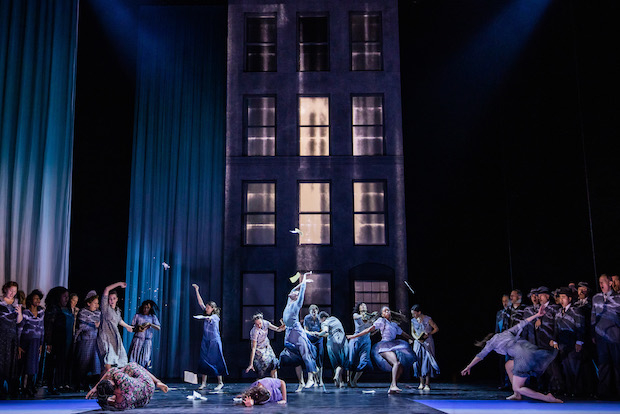Review: Unhappiness Transcends Time and Space in The Hours at the Metropolitan Opera

(© Evan Zimmerman / Met Opera)
Do you ever feel like you took a wrong turn many years ago, and now you've proceeded irrevocably down the path to misery? Then you have something in common with the three protagonists of The Hours, the new opera by composer Kevin Puts and librettist Greg Pierce, which made its world premiere last night at the Metropolitan Opera.
Based on the Pulitzer Prize-winning novel by Michael Cunningham (which became an Oscar-winning film starring Nicole Kidman, Meryl Streep, and Julianne Moore), The Hours tells the story of three disparate (and desperate) women who are all connected by the novel Mrs. Dalloway: Virginia Woolf (Joyce DiDonato) is writing it in 1923, while Laura Brown (Kelli O'Hara) is reading it in 1949. In 1999, Clarissa Vaughan (Renée Fleming) seems to be living out its plot as she buys flowers for a party she is hosting for her best friend and former lover Richard (powerful and resonant baritone Kyle Ketelsen), who has just won a major literary award. He thinks they're giving it to him because he is dying of AIDS, but Clarissa is a true believer in his writing — and she cannot help mentally returning to that magical summer in Wellfleet when they were happy, if not necessarily gay.

(© Evan Zimmerman / Met Opera)
The film artfully employed cuts and close-ups in unveiling this psychological drama that leaps across years and continents (a feat that occurs naturally in the novel-reader's imagination). Opera, especially when it is performed in a 4,000-seat house, offers neither intimacy nor instantaneousness. Characters like Clarissa's partner, Sally (a scandalously underutilized Denyce Graves), feel pushed to the margins, even if she gets roughly the same amount of stage time as her movie counterpart (Allison Janney) gets on screen. It's not fair, but there are some things film does better, and showing the complexity of a relationship in a series of meaningful glances is one of them.
Puts (who won his own Pulitzer in 2012 for his World War I opera Silent Night) compensates by leaning into one of opera's strengths, which is the use of music to establish time, place, and character. He wisely avoids anything that might sound like Phillip Glass (who scored the film) and creates musical worlds for each of the three women (assertive Bernstein-like melodies for New Yorker Clarissa, itchy Mancini kitsch for disenchanted LA housewife Laura, and unstable harmonies for brilliant and suicidal writer Virginia).
He also uses motif to convey theme (the Westminster chimes take on a sinister quality in this story about the oppression of time). Over the course of the opera, Puts breaks down the borders between the three musical realms, resulting in a score that is dynamic and often startlingly beautiful (every bit of the orchestrations come through under the formidable baton of Yannick Nézet-Séguin). Frankly, it is also hard to remember. You won't be whistling any of these tunes in the shower.
Director Phelim McDermott (who helmed the Met's excellent production of Glass's Akhnaten) takes his cue from the score with a staging that is ever-moving, weaving together the three narratives into something approaching a cohesive whole. Unfortunately, Tom Pye's sets tend to segregate the performers into little boxes of playing space. Flats rumble in and out on castors, unintentionally adding to the score while contributing little to the storytelling. Pye is most effective when he keeps it simple, like when a billowing sheet drops down from the proscenium to represent the beach at Wellfleet (projection designer Finn Ross elegantly completes this illusion). It allows the performers the roam the entire stage in this sepia memory (exquisitely lit by Bruno Poet), which dissolves just as quickly as it appeared. It's a marvelous moment of nimble precision amid so much lurching heaviness.

(© Evan Zimmerman / Met Opera)
It is perhaps appropriate that a story about interior lives utilizes the largest part of the cast to represent the psychological forces driving our three protagonists. The protean Met chorus plays the voices inside their heads (while also moving all those set pieces). Their movement, and that of the dancers who seamlessly coexist with them, is sleek and stylish as choreographed by Annie-B Parson, who is making an extraordinary Met debut. She collaborates particularly well with Pye on a late costume change that is perhaps the most breathtaking I have ever witnessed. It puts Kelli O'Hara's Tony Awards quick change to shame.
The Hours benefits from having an actor like O'Hara, who quietly captures Laura's fraught emotional state while giving us chills with her pristine soprano. Her second act duet with DiDonato is especially gorgeous, the aural equivalent of watching rare tropical fish swish around each other in an aquarium. Fleming is the stiffest of the three actors, her grimace plastered on like a relief sculpture in a climatic scene. But perhaps that is appropriate for a character unable to express what she truly feels; and Fleming still has one of the most arresting voices to emanate from the Met stage.
The Hours is by no means an evening of light entertainment. The title offers truth in advertising (it takes exactly three hours to perform, depending on how chatty your audience is at intermission), and I would never recommend it for a date unless the message you're trying to send is, ''I'm emotionally taxing."
Still, if you can make it to the end, you hear a remarkable trio, when the three women finally come together in a musical room of their own. Sorrow has never sounded more beautiful.











